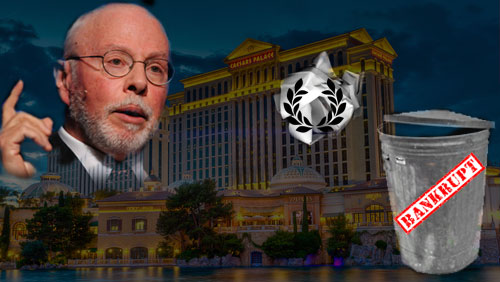 [polldaddy poll=8480338]
[polldaddy poll=8480338]Caesars Entertainment— with almost 40 properties in 14 U.S. states and the Canadian province of Ontario—is under attack from all fronts as it struggles to restructure its gaming industry-high debt load of $25.5 billion, which is why we decided to ask our readers, “When will Caesars file for bankruptcy?
40% said, “Won’t file for Bankruptcy.” 32% voted, “Before April 1st, 2015, “ and 28% said, “After April 1st, 2015.”
The debt has been on Caesars’ books since 2008 when TPG Capital and Apollo Global Management took the company private in a $30 billion leveraged buyout. Caesars Entertainment Operation Co., the company’s chief operating division, controls about 80% of the overall debt and is running out of cash to meet the obligations.
Framework to a restructuring agreement has been reached, which includes a pre-packaged bankruptcy covering CEOC and moving the casinos controlled by CEOC into a real estate investment trust (REIT).
Caesars has received three default notices from second-tier bondholders since this summer, actions that the company has termed “meritless.”
Before Thanksgiving, a creditor group led by UMB Bank, holding $1.25 billion, filed a lawsuit in Delaware, demanding that Caesars corporate executives be removed from control of the company.
Creditors claimed Caesars directors — led by TPG’s David Bonderman — “thoroughly ransacked” the company, keeping the best properties within Caesars while leaving CEOC with all the liabilities.
Caesars financial Spokesman Stephen Cohen said the claims were “baseless.”
The New York Post reported that Paul Singer’s Elliott Management, was behind the lawsuit against Caesars Entertainment Corp. filed by UMB Bank.
The lawsuit accused Caesars Entertainment Corp. of undertaking an “epic and fraudulent scheme” to sell its assets on discount to two related divisions. Elliott called it a $4 billion “outright looting” plan.
Singer stands to make a fortune if Caesars enters a pre-Dec. 19 filing, allowing Singer to money in on his bonds and credit default swaps, rather than just the bonds.
Caesar’s other bondholders disagree with Singer and want the bankruptcy to be delayed until January 14, since the company can’t move the relevant cash to its balance sheet until then.
Next week, we ask, “Will Facebook ever be viable for real-money gaming?” as the presence of popular free play games by developers like Zynga have millions of frequent players and the ability to move to real money gaming would be a quick transition. Check back next week to see what our readers think.
